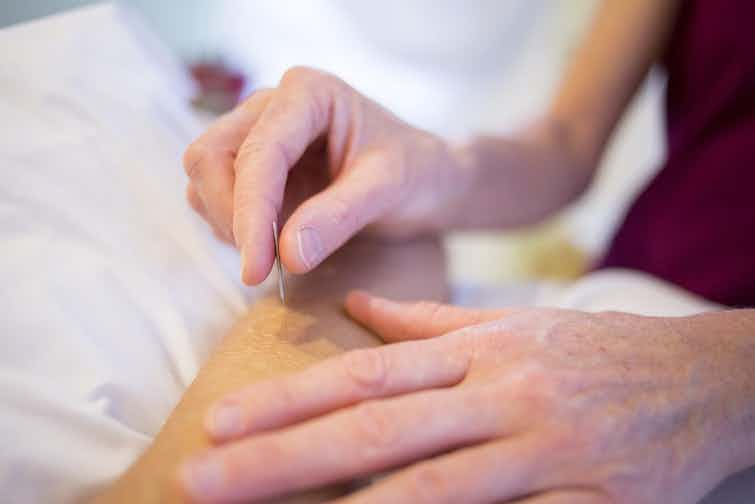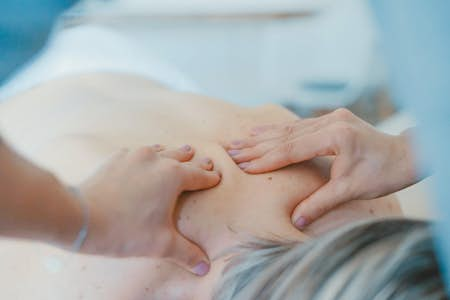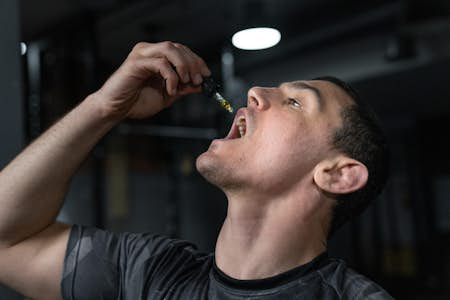Acupuncture is an alternative treatment for pain relief, such as back pain.
Although it is typically safe to use acupuncture needles yourself, it's crucial to understand how to administer the treatment correctly.
This will ensure acupuncture is effective for your condition and can help you avoid potential side effects.
Read everything you need to know about acupuncture needles, including NHS guidelines on using needles yourself and the safety of this alternative therapy.
What is acupuncture?
Acupuncture is an alternative treatment found in traditional Chinese medicine. It involves inserting fine needles into specific acupuncture points across the body to relieve pain.
The National Institute for Health and Care Excellence (NICE) currently recommends acupuncture as a complementary treatment for:
- Chronic pain, including tension-type headaches
- Migraines
- Prostatitis
- Hiccups
You can access Western practice acupuncture via the NHS, with many professional acupuncturists offering this treatment across the UK.
Types of acupuncture needles
There are several types of acupuncture needles, each made from a different handle material.
These needles are compatible with different types of acupuncture. So whether you visit an acupuncture clinic or want to administer the treatment yourself, a practitioner can help you choose the right needle for your specific condition.
Copper handles
Copper-handled acupuncture needles are very popular in traditional Chinese medicine and Korean acupuncture.
These needles are flexible and easy to manipulate into acupoints, especially when used by expert acupuncturists.
Plastic handles
Acupuncture needles with plastic handles are easier to place than copper handles, making them a better choice for beginner acupuncturists.
Filiform needles are a typical choice for modern medical acupuncture, made from stainless steel and often equipped with plastic handles or guide tubes.
For example, Classic Plus acupuncture needles often come with an individual guide tube. These tubes help a practitioner position thinner needles in acupuncture points.
Plastic-handled needles are also often colour-coded, making them easier to use and identify throughout treatment, too.
Seirin J Type needles are an example of plastic-handled acupuncture needles. These needles are ultra-fine, with plastic handles to improve grip for the practitioner.
Stainless steel handles
Some acupuncture needles also have stainless steel handles.
Acupuncturists use these needles for electro-acupuncture and moxibustion, which uses an electric current to heat the needles during insertion.
Unlike copper needles, stainless steel-handled needles are easier to insert and less likely to buckle. However, some practitioners believe they are less sensitive than copper or plastic.
Some acupuncture needles are also embedded between plasters, to make them easier to insert and remove. This is particularly important for auricular (ear) acupuncture.
Using acupuncture needles yourself
It’s possible to use acupuncture needles at home, but there are a few essential requirements to follow for your safety.
The NHS requires you to attend at least three appointments at an acupuncture clinic before trying it out for yourself. This allows you to learn how to apply the needles to specific points across the body correctly.
Using acupuncture needles yourself typically involves four disposable needles, one for each of your hands and one for each of your feet.
If you want to use acupuncture needles yourself, follow proper hygiene practices, including:
- Cleaning the skin and checking it for signs of infection
- Washing your hands before opening a disposable acupuncture needle pack
- Disposing of any needles in a sharps bin after treatment
Don't touch the needle points, and only use the needle handles provided.
Your doctor should also give you all the needles and sanitising equipment you need and a sharps bin for disposal and swabs.
Speak to your healthcare provider when you've filled the bin or if you experience any uncomfortable side effects during treatment at home.
Health Times spoke to Dr Bernadette Ward from Ireland's Acupuncture Foundation, who had words of caution, telling us: "Acupuncture is a valuable treatment for many conditions. I would always recommend attending a professionally registered acupuncturist. I would never recommend self-treatment. A practitioner trains for several years, so self-treatment is at best ineffective and at worst risky. The benefits of attending a trained, registered professional acupuncturist are many. Check your national professional acupuncture registers for treatment information and to source a practitioner."
Acupuncture without needles
Patients who want to try acupuncture at home without needles can try acupressure.
Acupressure involves applying pressure with your fingers to specific points of the body. It is safe to practice at home.
Often called G-JO, acupressure stimulates pressure points in the same way as acupuncture needles.
Although acupuncture is rarely painful, acupressure is a good choice for anyone who doesn’t like the idea of needles!
Understanding acupuncture needle safety
Acupuncturists across the UK use many different types of acupuncture needles.
Each needle plays a vital role in this alternative treatment, allowing practitioners to identify and treat individual health concerns.
Chinese medicine favours copper handles, whereas modern acupuncturists typically use stainless steel needles with plastic handles for ease of use.
Using acupuncture needles at home is safe, but following the correct safety procedures is essential.
This will ensure you safely and effectively complete your acupuncture treatment, practice good hygiene, and correctly dispose of used needles.
Before exploring alternative therapies, it’s vital to ensure you know what’s really going on in your body.
With Scan.com, you can choose from 10 scan types at over 250 clinics nationwide to get a clear diagnosis and ensure you’re fully informed when you make choices around your treatment.
Visit Scan.com now to learn how it works and book your scan.








